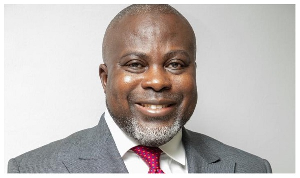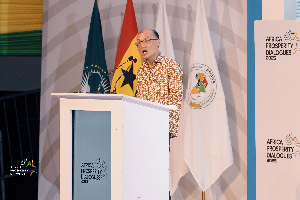Accra (Greater Accra) 14 June ?99
Ghana's domestic debt as at the end of December, last year, stood at 4.476 trillion cedis, while total external indebtedness for the same period was 5.89 billion dollars, Mr Kwame Peprah, Minister of Finance, told Parliament on Friday.
Mr Peprah, who was answering questions pertaining to his sector, said the government has taken initiatives, both bilaterally and multi-laterally, to establish a case for the easing of the debt burden of the country.
Mr Francis K. Buor, NPP Offinso South, had asked the Minister about the quantum of Ghana's domestic and external debt as of December 31, last year.
Mr Peprah said even though under the current international arrangement, Ghana is on the borderline of nations which do not qualify for debt write-offs, the country has benefited from other reliefs, including grants.
The Minister told the House that the government intends to review all debt reliefs made available to the country, saying "we are looking forward to seeing what is in the package and avail ourselves of the relief that will be in the best interest of our nation".
On the submission to Parliament of a quarterly report on the performance of the economy six weeks after the first meeting of the House, as directed by the President in his sessional address and in conformity with the constitution, Mr Peprah acknowledged the delay in the submission of the document.
He explained, however, that since this is a novel exercise, there has been some delay and gave the assurance that the Ministry would endeavour to cut the delay.
Asked whether the country is using its economic infrastructure judiciously to create more wealth and help repay its loans, Mr Peprah said Ghana is among the few developing countries which has not requested the "Paris Club" for a rescheduling of debt repayment.
"Indeed, we have been diligent in meeting our debt servicicng schedules".
On a producer price for coffee as it obtains in the case of cocoa, the Minister said the pricing of coffee had been liberalised, and the government is no longer in the business of fixing the price of that commodity.
He announced that the pricing of maize has also been liberalised and explained that the government has policies for various commodities, and "we do not have to apply uniform pricing for all commodities".
Asked whether the government will reconsider the liberalisation of the pricing of coffee since the policy is killing the industry, Mr Peprah said the Executive has been constantly reviewing the policy.
He said in the course of the country's "agricultural revolution", "we may decide to change direction of policy to serve the best interest of the nation".
On how monies under the General Government Services (GGS) were used last year, he replied that in 1998, out of the 301.01 billion cedis provided under the GGS, 241.238 billion cedis was disbursed on local conferences, subventions and on services under the control of both the Accountant-General and the Director of Budget.
These services include the printing of value books, judgement costs, adjustments in personal emoluments and clearance of debts.
The Minister explained that the GGS volume of the annual estimates caters for expenditures, which have general application to all ministries, departments and agencies (MDAs), depending on the consolidated fund as a balancing item.
It also caters for contingencies, such as disasters and adjustment of salaries.
On the disbursement of the loan from Exim Bank of India for the purchase of 200 Tata buses, which Parliament approved by resolution in 1997, Mr Peprah explained that for the effectiveness of the credit, the Bank of Ghana was requested to issue a guarantee to cover both principal and interest payments.
The loan was contracted under an agreement between the GPRTU and Exim Bank of India.
Mr Peprah said the Ministry was unable to authorise the central bank to issue the guarantee, because shortly after the credit was approved, the government, as part of measures to improve its debt management, decided not to secure any more non-concessional facilities, and the Exim Bank credit was not concessional.
He told the House, however, that at the recently concluded Ghana-Germany bilateral talks in Accra, the government was able to secure a 10 million-deutsche mark concessional loan from the German Government for the purchase and supply of bus chassis and spare parts for use by the GPRTU and other beneficiaries.
Asked how much has so far been realised from the leasing of "Regina House' in London, Mr Peprah said since 1989, a total of 10 million pounds has been collected.
He added that this has been paid into the consolidated fund through the general collection account.
He could not, however, give information on how many leaseholds Ghana has in
London, saying " I cannot give the information. I don't know it".
General News of Monday, 14 June 1999
Source: --
















